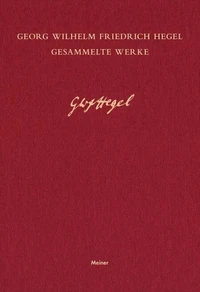In "The Logic of Hegel, " Georg Wilhelm Friedrich Hegel articulates a groundbreaking framework for understanding logic and metaphysics that transcends traditional dichotomies. Employing a dialectical method, Hegel explores concepts such as being, essence, and notion, revealing how these ideas evolve through contradictions and resolutions. His dense prose, often challenging yet rewarding, reflects the complexity of thought found in German Idealism, making the text not just a study of logic, but a profound inquiry into the nature of reality itself.
The work situates itself within the broader philosophical landscape of the early 19th century, engaging critically with predecessors like Kant while laying the groundwork for modern philosophy. Hegel, a pivotal figure in German Idealism, was significantly influenced by the tumultuous European milieu of his time, marked by the Enlightenment and Romanticism. His experiences as a teacher and theologian shaped his perspectives on the interconnectedness of thought and existence.
"The Logic of Hegel" emerges from Hegel's quest to reconcile subjective experience with objective reality, channeling the influence of his predecessors while forging a uniquely self-reflective system of thought. This book is invaluable for readers aspiring to grasp the intricacies of Hegelian philosophy and the evolution of Western thought. Scholars, students, and anyone curious about the foundations of logic and metaphysics will find in Hegel's work a compelling invitation to explore the dialectical progression of ideas, making it a timeless addition to the intellectual canon.
In "The Logic of Hegel, " Georg Wilhelm Friedrich Hegel articulates a groundbreaking framework for understanding logic and metaphysics that transcends traditional dichotomies. Employing a dialectical method, Hegel explores concepts such as being, essence, and notion, revealing how these ideas evolve through contradictions and resolutions. His dense prose, often challenging yet rewarding, reflects the complexity of thought found in German Idealism, making the text not just a study of logic, but a profound inquiry into the nature of reality itself.
The work situates itself within the broader philosophical landscape of the early 19th century, engaging critically with predecessors like Kant while laying the groundwork for modern philosophy. Hegel, a pivotal figure in German Idealism, was significantly influenced by the tumultuous European milieu of his time, marked by the Enlightenment and Romanticism. His experiences as a teacher and theologian shaped his perspectives on the interconnectedness of thought and existence.
"The Logic of Hegel" emerges from Hegel's quest to reconcile subjective experience with objective reality, channeling the influence of his predecessors while forging a uniquely self-reflective system of thought. This book is invaluable for readers aspiring to grasp the intricacies of Hegelian philosophy and the evolution of Western thought. Scholars, students, and anyone curious about the foundations of logic and metaphysics will find in Hegel's work a compelling invitation to explore the dialectical progression of ideas, making it a timeless addition to the intellectual canon.

 , qui est-ce ?
, qui est-ce ?